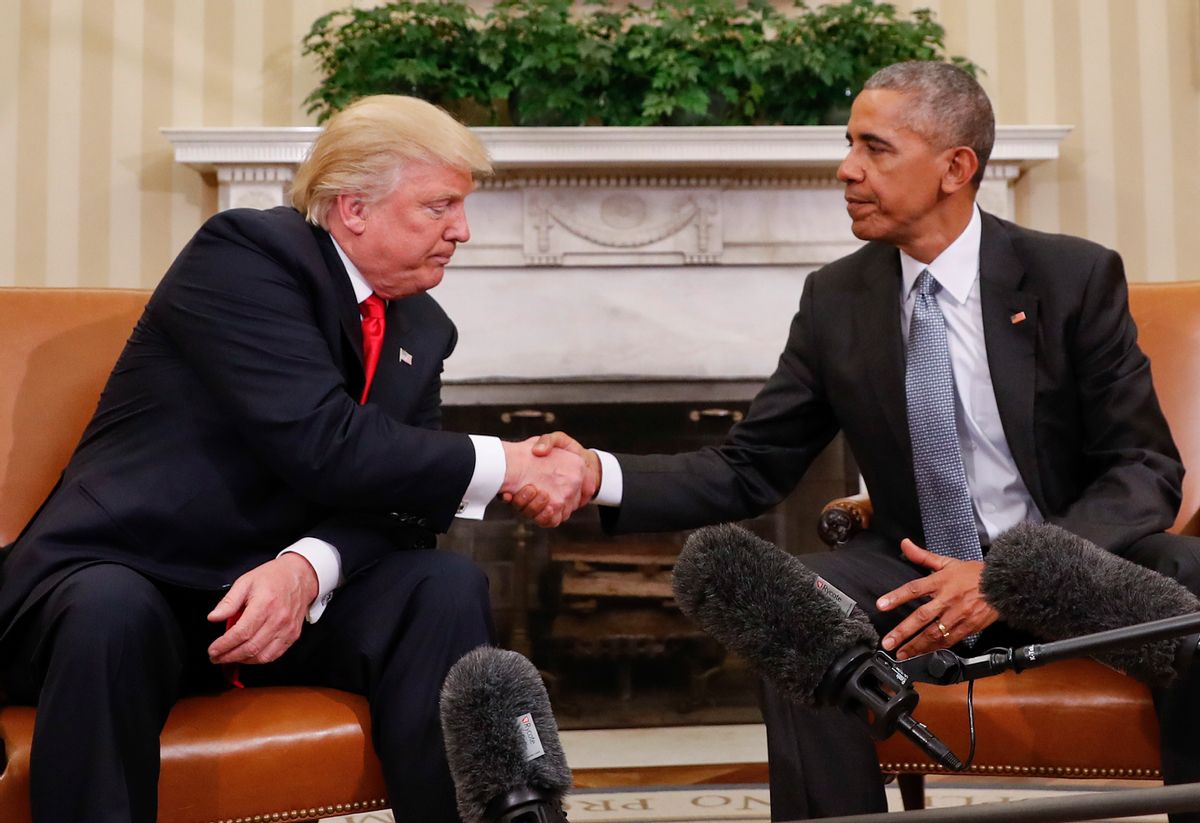WASHINGTON — After 10 weeks, dozens of tweets and one rollicking news conference, Donald Trump's transition into the White House has left little doubt that the man Americans elected in November is the president they'll get.
The immense responsibilities of the office and the daunting decisions that await Trump when he takes office Friday have not appeared to change the confrontational, divisive Republican.
Just days away from his inauguration, Trump is still litigating old campaign fights and picking new ones with intelligence agencies and Rep. John Lewis, the Georgia Democrat and civil rights movement veteran. Trump is refusing to be boxed in by the conservative ideology his party prefers and he's battling with journalists, yet still craves their attention.
To supporters, Trump's handling of this transition period is proof that the political novice-turned-president-elect plans to follow through on his campaign promises to take a sledgehammer to Washington's traditional ways.
"The American people voted for change," Trump spokesman Sean Spicer said. "He is the instrument of that change."
It's clear, however, that a solid majority of Americans are not behind him. Trump is poised to enter the Oval Office with a far lower approval rating — 42 percent — than his three predecessors, according to Gallup, which only has comparable data going back to 1992. The previous lowest was George W. Bush, who won positive marks from 59 percent during his transition to office. Bush, like Trump, also lost the popular vote in a tightly contested race.
Gallup found just 44 percent of those questioned approve of the way the incoming president has handled his transition, compared with 83 percent approval of Barack Obama's transition. Sixty-one percent approved of Bush's transition.
That leaves a hefty task ahead for Trump, who must take the stage on Friday and, after swearing the oath, address perhaps his largest, broadest audience to date. Presidents typically call for unity and common purpose.
David Axelrod, a longtime political adviser to Obama, cast doubt on whether that was something Trump could do. He pointed to Trump's postelection "thank you" tour that took the Republican only to states he won.
"It might not be within his emotional range to be a unifying figure," Axelrod said. He acknowledged that some Democrats might resist any overtures from Trump, though he said total resistance would not serve his party well either.
Advisers and others who have spoken with Trump since the election say that despite his combative public presence during the transition, he's aware of the grand sweep of history as he approaches the presidency. He's told friends that he's drawn to both the ambition and style of Presidents Ronald Reagan, a Republican, and John F. Kennedy, a Democrat.
During a lunch with presidential historian Douglas Brinkley and other guests at his South Florida club, Trump said he was thinking about spending his first night in the White House sleeping in the famed Lincoln Bedroom. A participant in the lunch first recalled the conversation and Brinkley confirmed its accuracy.
Several people detailed their recent interactions with Trump on the condition of anonymity in order to disclose private discussions with the president-elect.
Trump is said to have become particularly fixated on veterans issues, evaluating numerous candidates to lead the Department of Veterans Affairs before settling on David Shulkin, an Obama nominee who is a VA undersecretary. The president-elect said he interviewed "at least 100 people" for the job, though aides said that was an exaggeration.
Between meetings at Trump Tower and Mar-a-Lago in Florida — and sometimes during them — Trump is said to be constantly making and taking calls on his personal cellphone from lawmakers, foreign leaders, aides and journalists.
But any behind-the-scene diligence and focus has largely been overshadowed by Trump's remarkably public battles — against the intelligence agencies, Hillary Clinton, actress Meryl Streep and, over the weekend, Lewis.
One of the biggest questions facing Trump as he prepares to take office is how his confrontational and unpredictable style will affect his ability to enact his agenda and manage the inevitable crises he will face. He has the benefit of a Republican-led Congress, but potential intraparty disagreements loom over spending and entitlements.
Health care will be an early test for Trump and the GOP. The president-elect says he expects Congress to repeal and replace Obama's signature health care law "essentially simultaneously," though he has not specified for lawmakers what he expects to be in a new measure. Some Republicans believe the complexity of the current system makes a fast overhaul nearly impossible.
Trump's relationship with Russia will shadow his inauguration. The Senate Intelligence Committee says it will investigate possible contacts between Russia and the people associated with U.S. political campaigns as part of a broader investigation into Moscow's meddling in the 2016 presidential election. The investigation will include interviews, and potentially subpoenas, for Trump aides.
During a freewheeling news conference last week, Trump acknowledged publicly for the first time that he accepts the intelligence community's assessment that Russia was behind the election-year hacking of Democratic groups. But one person who spoke with Trump following his full briefing with intelligence officials said the president-elect was still raising questions about what proof there was of Russia's role.
Democrats are yet to decide how they plan to approach a Trump presidency.
Lewis, who worked alongside Martin Luther King, Jr. during the civil rights movement, said he does not view Trump as a legitimate president, leading Trump to criticize the congressman in several tweets. Lewis and a small number of other Democratic lawmakers plan to skip the inauguration celebrations.
Obama, who has been offering advice to Trump both publicly and privately since the election, questioned whether a president can be "improvisational" in office. But in an interview with CBS' "60 Minutes," he also suggested his successor's unorthodoxy should not be misjudged.
"Don't underestimate the guy," Obama said. "He's going to be the 45th president of the United States."
___
AP Polling Director Emily Swanson contributed to this report.
___
Follow Julie Pace at http://twitter.com/jpaceDC



Shares